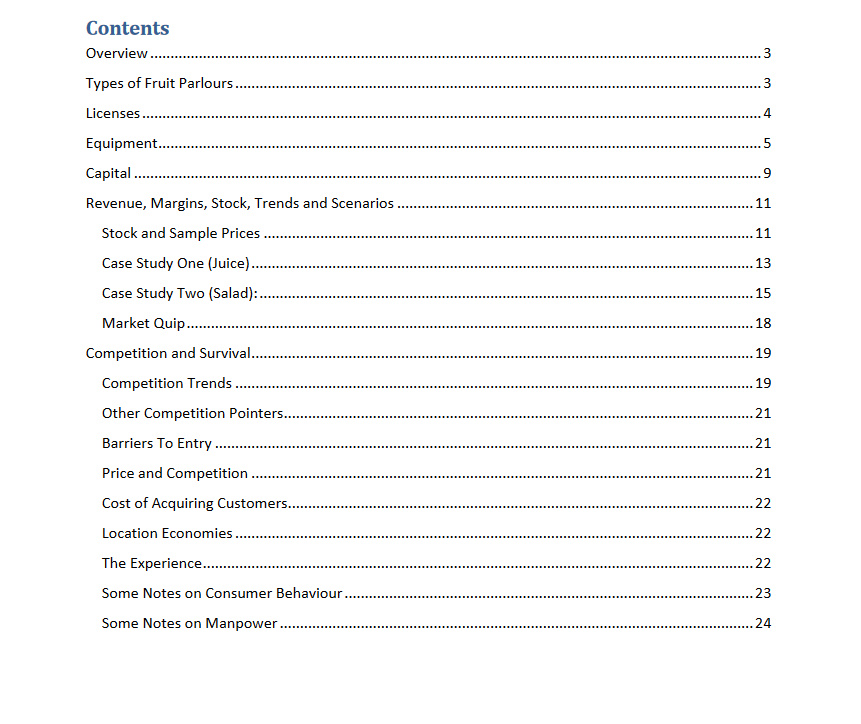Fruit and Juice Parlour Business Plan
Fruit and Juice Parlour Business Plan

Fruit and Juice Parlour Business Plan Overview
This is a Fruit and Juice Parlour Business Plan to the standard Fruit and Juice Parlour Business.
Fruit consumption is elastic. Thus people consume more fruits as their income improves and vice versa. (Comparatively an increase in income does not lead to more consumption of vegetables). However due to more information about benefits of fruits being made available many who normally won’t eat fruits everyday are substituting one meal for fruits. Say instead of taking ugali / chips for lunch they consume fruit salad.
By and large as the economy grows so will fruit consumption. On the other hand a rise in the inflation rate and prices of basic products will reduce consumption of fruits.
Bananas are the most consumed fruits in Nairobi followed by Oranges, Mangoes, Avocado and Pawpaw. Bananas show the least variation in prices throughout the year, this is followed by oranges. And with the increased importation of apples their prices are stabilizing. Bananas are mostly sold in wholes, used in almost all salads and sometimes in juices.
A consumer survey has indicated that over 90% of households purchased their fruits and Vegetables from two or fewer outlets, about 80 % used the same number for meat. For staple foods (sugar, maize flour, tea leaves etc) though only 30 % used a regular Fruit and Juice Parlour Business. According to World Health Organization, the average recommended level of daily fruit and vegetable intake is 400g per person per day or roughly 150 kg per person per year.
Types of Fruit and Juice Parlour Business
The fruit parlour (whole fruits, juices and salads) business can be loosely classified into
the following categories.
1) Street/ Mkokoteni / Wheelbarrow Parlours – These have carts, wheelbarrows and other make shift structures largely positioned in downtown areas of various towns . They largely sell salads, and pieces of whole fruits. A few sell juices which they make at home.
2) Individual, Small Business Office to Office Vendors – These could be individuals or businesses that mainly make juices in homes and deliver to offices.
Some focus on specialty dietary juices, (say for diabetic people). Mostly these are the kind of juices that would be not commercially viable to produce for the mass market say carrot juice. Some use the internet to market themselves, either using Facebook, free online classifieds or own websites through which one can order.
There are also many individual vendors who produce the normal fruit juices and salads and deliver to offices, shops, employees and students. These vendors penetrate the market by offering a line of credit, liaising with someone inside the organization, or competing on price since they pay no licenses or rent. They mainly grow by word of mouth.
3) Formal Street Fruit and Juice Parlour Business– These are located in proper stalls or permanent premises. They make juices in real time, and have more and bigger blenders, juicers and juice dispensers. They portray a high level of cleanliness. The staff wears aprons or uniforms. They also sell snacks mostly cakes.
4) Hotels/ Restaurants – Many hotels now offer juices and salads as part of their menu. A section of fast food fish and chips restaurants favor passion juice which they sell for between Ksh.15 and Ksh.20.
5) Other Informal Players – These include those who could be selling fruits in various parts be of a town or along highways. One moment they are there, the next they are not.
Download Fruit and Juice Parlour Business Plan / guide here